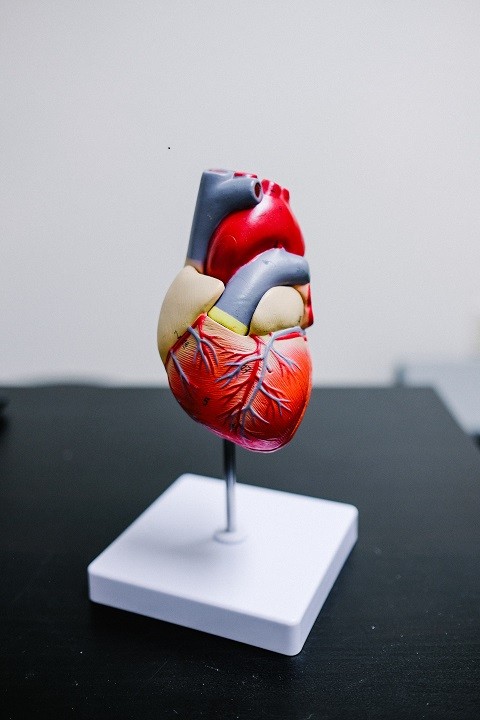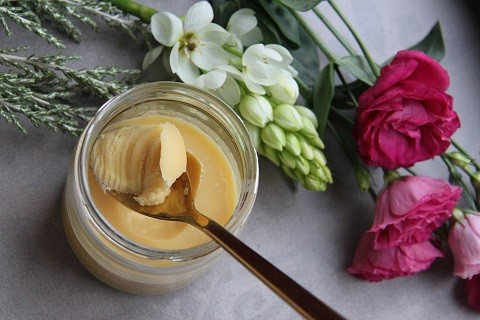Many of us might have heard that in olden days most of our foods are prepared with cow ghee. I remember my grandma told me that many foods in olden days were prepared from cow ghee. Ghee, the magical golden liquid, fragrant and healthy, was made from the milk of grass-fed cows that grazed in a natural and unpolluted environment. Ayurveda places it on the top of the must-have food list.
Does ghee increases the cholesterol?

- Many of us are aware of that -there are two types of cholesterols—low-density lipoproteins (LDL), which are called bad cholesterol and high-density lipoproteins (HDL) that are known as good cholesterol. It is the bad cholesterol that leads to health problems since it accumulates in the arteries. Therefore, it is important to maintain a balance between LDL and HDL for healthy cholesterol levels.
- Studies have proved that ghee does not seem to be linked to heart disease, when taken in moderation.
- Ghee is high in mono saturated omega 3. Ghee can be consumed in small quantities like one to two teaspoon as a source of saturated fats. The antioxidants, conjugated lenoleic acid , fat soluble vitamin A,D & E present in ghee is heart healthy.
- The ancient book Sushruta also states that ghee is sweet, mild in action and cold in potency, and does not cause blockages in the vessels. Thus, it is safe to say that ghee does not cause any blockage or deposits in the blood vessels. Hence, ghee does not raise cholesterol.
- However, while it is good to include ghee in our diet, it should always be consumed in small quantities. Large quantities of ghee may be difficult to digest leading to toxin formation.
- According to Ayurveda, which our today’s dieticians also believe, that cow ghee can be consumed daily in small quantities. Children can have a larger quantity every day. Studies have proven that ghee can be good for lowering bad cholesterol and increasing good cholesterol.
- An expert has conducted several studies on rats to understand the heart-health risks of ghee.Among healthy animals,he found that packing their diets with up to 10% ghee did not lead to elevated levels of harmful cholesterol or other markers of heart disease. More than 10%, however, increases blood’s level of unhealthy cholesterol and triglycerides.
Other Health Benefits
Ayurveda most eminent superfood is ghee. In India, ghee is almost the most essential in every household. Ghee is really a superfood, a golden liquid which has intangible health benefits.

1)Healthy Guts
Our body converts fiber into butyric acid since ghee already has it it makes the body’s job easier so as compared to any other oil ,meals cooked in ghee are lighter on the stomach. Ghee contributes to healthy digestion by helping healing and repair the stomach lining. Taking a spoon of ghee(melted warm) early in the morning really helps in the health of digestive tract. Added to that SCFA(short chain fatty acids) in ghee now recognized as prebiotic something which creates an optimal environment for the gut friendly bacteria to prosper.
2)Antioxidant
Ghee is effective in neutralizing free radicals and thereby it also reduces the risk of cancer.
3) Glossy skin
Ghee has some amazing fatty acids which helps in hydrating your skin. Ghee is a natural moisturizer and helps in keeping your skin moisturized in dry and windy atmosphere.
4)No nasal congestion
Ayurveda has excellent nasal drop remedy which is known as Nastya, this treatment involves 2 drops of warm cow ghee first thing in the morning in your nostrils. By putting drops of ghee in your nasal passage in the morning can give you quick relief from all these symptoms as ghee travels all the way down to your throat and manages throat infection. Make sure the ghee is pure and it is warm to come to a luke warm temperature when you put the drops. Better to consult ayurvedic physician before trying this. To attain all these benefits, ghee should be pure ghee.
By dropping some of the drops in both of your nostrils helps clear your sinuses, head pain, migraine and cervical spondylitis.
5) Bone Health
Ghee has vitamin D for stronger bones and vitamin K2 that prevents tooth decay. Ghee acts as lubrication to our joints and reduces the inflammation.
6) Great Stamina
It is texted in Charaka Samhita that consumption of ghee is good for health as it promotes agni, increases semen in males, and is good for ojas. . It destroys germs and toxins in our bodies by increasing immunity.
7) Eye Health
Another interesting fact about ghee is that it reduces pressure in your eyes, if you are suffering from glaucoma. Pure cow ghee is a rich source of Vitamin A that improves one’s overall health and regular consumption of it in your diet, improves optimal eye health.
8)Good Mental Health
If you are suffering from baby brain or loss of memory, or lack of concentration, difficulties learning, it’s good to take some ghee every single day because, it helps all three aspects of mental function. It helps your learning, it helps your memory and it also helps your recalling.
9) Dairy intolerants- friendly diet
A lot of people are dairy intolerant and that’s usually either because of lactose intolerance or casein intolerance .Ghee doesn’t have any impurities and if you have any kind of dairy sensitivities, ghee is going to work you without any problem.
10)Healing Properties
Ayurveda values ghee as a valued food as it has a number of healing properties. Ghee consists of fat soluble vitamins, which help in weight loss. It also helps in balancing hormones.
WHAT GHEE TO CHOOSE?
- Ghee is a type of clarified butter used in the cuisines of India and the Middle East.Traditionally,it is made by gently heating cow’s-milk butter until its water content evaporates. And then its milk solids can be skimmed and strained away,leaving behind only the liquid fat.
- Ideally ghee made from A2 milk is good , that is A2 ghee which are made from A2 Indian/desi cows. A2 Ghee is made using A2 milk of Indian native grass-fed cows,that are more nutritious and healthy, as compared to hormonal injected and adulterated milk that is prevailing today.
- It is yellow in colour attributed to the prevalence of Beta-carotene, a colouring pigment discovered in A2 milk. It is a source of lycopene that provides a prelude to vitamin A.
- A2 ghee has more protein, iron, sodium, calcium, vitamin A, D+, E, K& Omega 3 & 9 fatty acids as compared to other locally available ghee.
- The high level of Omega-3 fatty acids and A2 protein helps build up HDLs or High-Density Lipoproteins that combat cholesterol levels by extracting them out of the bloodstream, thus maintaining healthy heart.
HOW MUCH GHEE?
One- three teaspoons of melted ghee per day in addition to the regular oil can be used for cooking.
According to your age, according to your activities, according to how you burn your calories, you can consume ghee. One teaspoon full is a must but you can add more in case you are doing more of rigorous activities. Little ghee on chapathi,ghee in rice,seasoning of dhals are our culture of eating. Ghee not only adds taste and flavour, but definitely it is a total health.
THE TAKE AWAY
It’s amazing to know that ghee balances the both vata ( manages movement in the body and mind) and pitta(manages digestion and metabolism, fire in the body). It is documented in ancient text that consumption of ghee promotes memory and intelligence, increases overall immunity. As long as you maintain a healthy diet, it is safe to use the right and moderate ghee in your everyday diet. Enjoy the aromatic nutty flavour of ghee in your diet.

